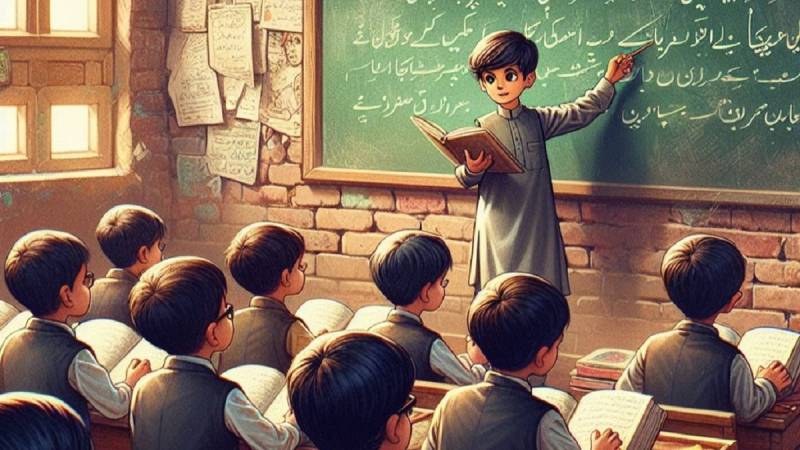
Education is considered a key to freedom and, thus, a fundamental human need. When Hegal explored the concept of freedom, he associated it with the awareness about being – or 'presencing' in Heideggerian terms. We explored the world and learned lessons, completing a long journey from irrationality to reasoning. Humanity evolved itself. We faced the Dark Ages but moved to a brighter era, contributing many bright ideas.
From the scientific side, the ideas of physics and biology, where great minds in human history explored magnanimous thoughts about the universe and human anatomy. On the other hand, Marx saw the coming of the age of exploitation, Weber presented the idea of an ideal bureaucracy, Freud explored the sub-conscious side of the human mind, and Rousseau talked about free will.
All of this happened because humans have a quest to explore self-dynamics. What backed this quest was the force of education. The key of education unlocked the idea of the Big Bang and made us aware of the rights of self. It pushed us to cross the generalised perceptions about women, see them in some of the same positions as men, and then proceed to give them the positions they deserved. All in all, it captivated us to cross the insanity and enlightened us with reasoning. Education, nonetheless direct or indirect, has helped humanity grow, evolve, and become self-conscious.
What is happening now in Pakistan is really against the odds. Either education is inaccessible for many, or it has lost the basic means for which it was considered significant or even valuable.
In the first form, education has become expensive, and indigenous communities have lesser participation in access to education. Furthermore, the social strata have divided the education system into a few layers, each with different resources and definitions of education attached to it. Simply, the elites have different forms of education, which distinguishes them from others, and an elitist conception of education has converted education into capital. At the same time, a man in the street suffers a blow while attempting to get an early education, and the system has made him sceptical.
Our education system banks on the ability to cram things into the brains of students rather than develop an understanding of core concepts
The commoner does not believe in the promise of education anymore. Why? Is it because the commoner does not count on merit, and he has explored the veneers of meritocracy but could not find contested mobility as truth?
The Pakistani middle class does not rely on meritocracy but tries to find artificial means of mobility, for which we have the empirical example of people moving out of Pakistan in search of employment. They are either trying to earn a livelihood overseas and push their children to do the same because, in this way, they will have more chances of accessing life resources, or Pakistan faces brain-drain where a student rich with knowledge no longer believes in the system and moves out of the county for a better future where, in many cases, they can significantly improve their status quo.
Sabeeha Hafeez argues in her book, The Changing Pakistan Society, that Pakistani society has given birth to a new kind of middle class, which she calls the Artificial Middle Class (AMS). She believes the AMS doesn't rely on conventional means of success and mobility but tries to find different means to achieve upward mobility, such as moving out for a work visa or being involved in other criminal activities such as smuggling. The other perspective tells us about the indoctrination of students by our education system, which banks on the ability to cram things into the brains of students rather than develop an understanding of core concepts.
As I mentioned, history witnessed the evolution of society, and education provided the key to it. The condition of schools, colleges, and universities in Pakistan has taken us on a path where a student is treated as an entity, an amorphous object, and a solid material that they – the parents and the system – can mould into the shape of their desire. A child in this education system seems predestined and would be unable to choose a career path of their choice. When assigned to perform a particular task chosen by their parents or the system, they fail to feel values such as freedom, breeding societal intolerance. It gives birth to reluctance to stick to a particular notion or perspective, and this is what we are seeing in today's Pakistani society, where people have confined themselves into a cage of irrationality.
Furthermore, the education system has failed to produce productive individuals who possess the ability to do something creative. Despite a surge in the number of children enrolled in the education system [despite the surge, Pakistan maintains the world's largest out-of-school population], schools have not been able to nurture children smoothly. With pressure from parents, colleges have failed to create different ways to foster diverse skills in students and still reluctantly stick to plan A, 'two professions' where they have to choose either the medical industry or becoming an engineer. Art has lost its place in Pakistani society, which has seen a decline in aesthetics. Universities have enclosed the space for students, imprisoning them in the semester system with a race for grade point average (GPA).
Undoubtedly, our education system has stopped producing individuals who could bring the Nobel Prize to us in science, medicine or mathematics. Gone are the times when we produced the likes of Eqbal Ahmed, who raised a voice for dissent; Hamza Alvi, who contributed to building a sociological perspective; and Arfa Kareem, who gave us the technological orientation – the world's foreseeable future. Our education system currently excels in producing machines and indoctrinating individuals where creativity has lost its place. We do not see education as the key to freedom, but we have made it an advocate for capital or education as capital itself.

